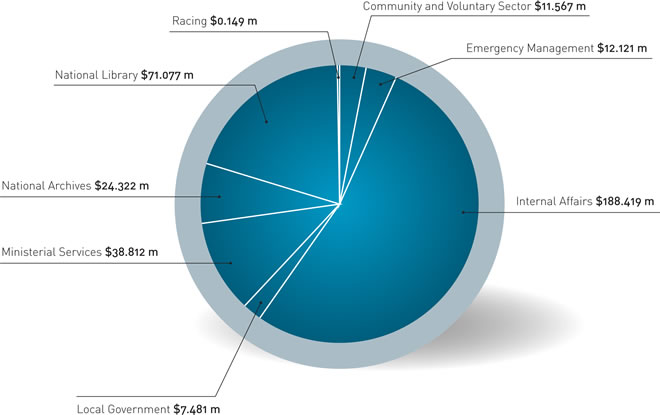Resource material › Corporate Publications › Annual Report 2011-12Pūrongo ā Tau
Overview of the Year
- Previous – Our purpose and values
- Table of Contents
- Next – Part A: Contribution to Outcomes and Objectives
On this page
This section provides an introduction to the Department and an overview of the past year
Nature and Scope of Functions
We serve and connect people, communities and government to build a safe, prosperous and respected nation.
The Department of Internal Affairs has a historically wide scope of functions and responsibilities that:
- provide services and support directly to people and communities
- provide services and support to Government and public sector organisations.
Our responsibilities include:
- providing all-of-government information and communications technology, supporting our Chief Executive as the Government Chief Information Officer and implementing the Directions and Priorities for Government ICT
- recording and managing New Zealanders’ identity information
- managing national civil defence emergency readiness, response and recovery
- supporting and connecting communities with information, resources, advice and funding
- supporting the effective operation of New Zealand’s system of local government
- regulating, encouraging compliance and enforcing the law for gambling, censorship, government recordkeeping, spam, anti-money laundering, and private security
- building and preserving New Zealand’s documentary heritage and public record
- supporting the effective operation of government and the Executive, including managing guest-of-government visits to New Zealand, supporting Royal Commissions of Inquiry and monitoring Crown entities.
We are also responsible for implementing the Government’s Better Public Service Result 10: New Zealanders can complete their transactions with the government easily in a digital environment.
Ministerial portfolios
We provide services to Ministers in seven portfolio areas:
- Internal Affairs (including responsibility for Archives New Zealand and the National Library of New Zealand)
- Civil Defence
- Ministerial Services
- Ethnic Affairs
- Local Government
- Racing
- Community and Voluntary Sector.
Summary of 2011/12 appropriations
We managed departmental appropriations totalling $353.948 million in 2011/12, broken down by our eight Votes as follows:
Departmental appropriations by Vote

Larger version of image Long description
Chief Executive’s Overview

This year has seen the Department play an increasingly pivotal role in the public sector with an expanded mandate in leading the government use of information and technology services and taking the lead for Result 10 of the Government’s priorities for better public services. Against this backdrop the Department has continued to deliver excellent services to people and communities.
All of our teams have contributed throughout the year, and there are some particular achievements I would like to highlight.
Operation Laminar was initiated by the Department’s Censorship Unit and was undertaken in conjunction with Interpol and other agencies, resulting in 55 arrests in 20 countries. Twelve children were removed from harm, including one in New Zealand.
Over 450,000 pages were added to the Papers Past website, including the first 50 years of Christchurch’s The Press newspaper. Papers Past is one of the most popular digital resources provided by the Department, with up to 10,000 visits per day in the past year. It represents one of many initiatives that are providing access for people to our documentary heritage through online collections.
We maintained our commitment to supporting the recovery from the Canterbury earthquakes. During the year, the Ministry of Civil Defence and Emergency Management’s response to the earthquakes was thoroughly reviewed, to provide insights into the civil defence framework for managing future emergencies. We also began to develop better ways to work with volunteering organisations and spontaneous volunteers in an emergency response.
The provision of authoritative identity information held by the Department is often crucial for people to efficiently and easily access other services and entitlement, and contribute to a competitive and productive society. A critical priority in this area is expanding the use of the igovt services. The signing of the partnering arrangement with New Zealand Post will use the Post network to accelerate uptake of our shared identity services in the public and private sectors.
In March the Department became the lead agency for Result 10 of the Government’s priorities for better public services. This work will be a priority over the next five years. Achieving the target of 70 per cent of New Zealanders’ most common transactions with government being completed in a digital environment by 2017 will be challenging. The transfer of the Service Transformation Programme to the Department will enhance our understanding of how people want to interact with government, a crucial component in developing services that will meet people’s needs.
Government has also strengthened my role as Government Chief Information Officer to accelerate the development and uptake of shared capabilities and common ICT tools that will support more citizen-centric services. This builds on the Department’s responsibility for leading and implementing the Directions and Priorities for Government ICT and advising Government on maximising the use of all-of-government ICT. The uptake of shared capability systems is potentially worth over $300 million in savings to government over the next ten years.
As the year began we focused on consolidating our new Departmental structure by cascading the principles of integration throughout the organisation. We undertook a number of reviews to reduce duplication and deliver functions more efficiently and effectively. As a result we have positioned ourselves to achieve an efficiency savings target of $9.8 million for 2012/13 and $8.9 million in outyears.
We also prepared for the transition of the functions of the Charities Commission to the Department on 1 July 2012. This will secure the viability of these functions in challenging financial times, while improving services to the charitable sector by leveraging the Department’s experience in regulation and running registry systems.
Over the past year we have demonstrated our ability to adapt to the challenges of rapidly advancing technology and the increased expectations of people and Government. I am confident that we are establishing the structures and capability that will allow us to continue responding to future challenges in more innovative, coherent and effective ways. We had notable successes across all parts of the Department and I thank all my staff for their hard work and commitment.

Colin MacDonald
Chief Executive
September 2012